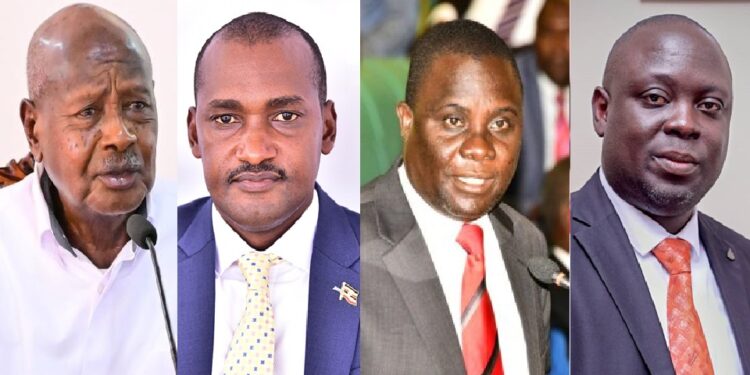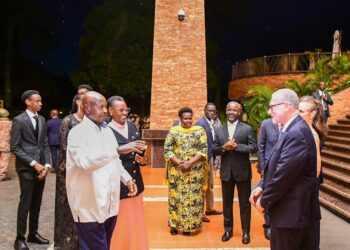The ongoing debate on Coffee as a top exchange earner is, in a way, very timely. It reinforces President Yoweri Museveni’s long running struggle to extract maximum value for farmers, industry players and the Country from our Coffee crop, by minimising or eliminating leakages along the value chain. Let’s give it a sweet aroma by sticking to the salient issues around it.
I wish to thank H.E the President for, so far, contributing valuable information for the public’s benefit through a series of statements in which he explained the purpose of rationalising various agencies, including the Uganda Coffee Development Authority (UCDA) and his historical involvement in Uganda’s agricultural economics.
UCDA’s proposed rationalisation by returning it to the mother Ministry (of Agriculture, Animal Industry and Fisheries) has attracted the most discussions, because Coffee is a golden crop, earning Uganda its greater share of foreign exchange for decades. Coffee is a treasure and it matters that the public has interest in it.
However, that interest should be based on facts and a genuine desire to contribute to the sector’s growth, given that, as per the President’s calculations, as a country we still earn peanuts from our coffee, despite being a leading exporter. Unlike many, President Museveni has not jumped into these discussions at “City Square”.
He has continuously been the lead promoter and marketer for Uganda’s coffee, locally and internationally, as a testament to his ambition to turn the lives of Ugandans around through agriculture. Who has been at the forefront of teaching the nation the economics and mathematics of coffee every time and the missed opportunities along the value chain, despite the perceivable contentment with the prevailing profit margins?
For some time now, coffee has been attracting good prices, and farmers have been enjoying due to increased consumption of coffee in countries like China and South Korea. At some point, the farmgate price of robusta coffee was Shs125, 000 compared to Shs6, 500 from last year-arabica was also in the same range. Imagine the drastic profit margin!
But underlying this prevailing boom season is the uncertainty of the global economy which is subject to different shocks at different times. While prices are good today, tomorrow, there could be a slump, like it happened with tea due to factors like war in Europe and Sudan, and changes in tastes and preferences in some of the traditional markets. Prudence requires that we foresee the future and take measures to prevent taking a hit in case global market trends change.
That means doing everything to maximise the value extracted from each coffee bean while cutting down on practices or costs that reduce the profit margin for famers as well as reducing the money available to reinvest in the sector. With market projections reading well, what else to do than planning on securing that market quantitatively and qualitatively?
The world wants out produce, but it must be of high quality and in reliable quantities. The issue at hand isn’t even UCDA, but how to expand production, value-addition and secure markets. UCDA, as the line agency, has played its role, but that role isn’t satisfactory as per the desired deliverables considering the meagre fraction of the global market that we control and the profit margin.
Questions have to be asked on the performance of UCDA-and other agencies-because the aim is to see improvement in performance in the various sectors.
Government reserves the right to check its systems and determine the arrangement most suitable for achieving specific national objectives. Coffee is a “national crop” and its sweet aroma fills our nostrils. We want to enjoy it more. Farmers are happy, including those who invested their Shs1million from the Parish Development Model (PDM). How do we ensure that they reap more and in sustainable way? By providing them with more inputs, extension services, enable them add value or sell at higher prices to processors, and so on.
Why are some discussants bent on locking our farmers in “subsistence mode” amidst the great potential in the global economy?
We risk being lulled by the prevailing good prices only to fall in a ditch in the near future. We have had bad experiences with tea, sugarcane, vanilla, cotton, and that’s because of lack of intentional regulation-and rationalisation.
In my engagement with members of the public on different media platforms, including X (Twitter), I have encountered people anxious about what’s going on, for some because they have misunderstood what’s at stake. One @Kyabarongo18352 said:
“thanks Mr kirunda but we people from Luuka we are just scared what will happen next after the government takes coffee already we had plenty of coffee here in Luuka in recent years then people decided to replace coffee with sugar cane we have been convincing people from sugar cane.”
My answer on my twitter handle @Kirunda_faruk:
“@Kyabarongo18352, who is taking (away) coffee and to where? Government is making coffee more profitable for farmers and they stand to appreciate why coffee is better than sugarcane at any scale of production.”
Others are discussing with a political or sectarian lens and that’s how countries like ours miss our transformation targets, because we miss the substance and go for “who” is raising it. President Museveni stands for the best interests of farmers and all sector players, not just in the line of coffee, but for other produce and products as he has enumerated in his statements. It’s about increased production and efficiency, value-addition and markets. He should be supported, not disrupted with common and unproductive political and sectarian sentiments. Buyers of our coffee will not want to know the ethnicity, religion, gender or political colour of the one who grew the coffee. All they want is quality and a sweet aroma!
The author is the Special Assistant to H.E the President of Uganda-Press and Mobilisation
Contact: faruk.kirunda@statehouse.go.ug
0776980486/0783990861
Do you have a story in your community or an opinion to share with us: Email us at editorial@watchdoguganda.com













